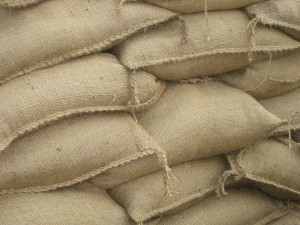 Yet another deluge accompanied by 80mph winds is coming, and Britain is bracing herself for more floods this weekend.
Yet another deluge accompanied by 80mph winds is coming, and Britain is bracing herself for more floods this weekend.
As is obvious to any reader of daily newspapers, such things don’t just happen. There has got to be an ultimately identifiable cause, and we’re the ones to identify it.
Most readers of daily newspapers are materialists who have to believe in physical contingency and anthropogenic causality. Since all adverse events are these days known to be caused by capitalism with its profligate abuse of ‘our planet’, culprits are never hard to pinpoint.
By following this line of thought, we’re approaching the sophistication of medieval European (or some contemporary African) witch hunters who ascribed every hurricane, epidemic or flood to human agency.
In one African tribe they go so far as to believe that every death is in fact murder by witchcraft. The bereaved family then seeks vengeance on the evil-doer, whom they track down using the kind of evidential rigour our prosecutors apply retrospectively to rape that may or may not have happened two generations ago.
While still in mourning the family avenges the death, then the culprit’s family retaliates in kind. This keeps everyone entertained in perpetuity, especially since human nature is such that deaths will occur with monotonous constancy.
Thinking along similar lines, Dave Cameron, who lists expertise in meteorology among his endless accomplishments, knows exactly why our bad weather is happening and who’s to blame.
It’s you, John, for driving to work when you could instead enjoy a pleasant 10-mile walk each way. It’s you, Jane, for turning your thermostat up when you could just as easily put a jumper and a cardigan over your thermal underwear. It’s all of us who have ever used an aerosol spray.
Far be it from me to question such an expert analysis or especially the intellectual quality of the conclusions drawn. However, if one could be allowed a timid historical reference, our floods aren’t exactly unprecedented.
One doesn’t even have to go as far as Noah, the last antediluvian patriarch who was famously spared by God in the Biblical flood – even though most readers of daily newspapers agree that the Biblical flood never happened, Noah never existed, and there is no God.
However, we know for sure that the great flood of St Petersburg did happen, and we even know exactly when: 19 November, 1824. The Neva broke banks and water rose 13.5 feet above its normal level, sweeping 462 houses into the sea and claiming 208 lives.
The calamity inspired Pushkin’s sublime poem The Bronze Horseman. Actually, Pushkin titled his sublime poem The Copper Horseman, a metallurgical oversight mercifully corrected by his pedantic English translators.
The English mentality doesn’t allow such impressionistic treatment of facts. Falconet’s equestrian statue is made of bronze, and Pushkin ought to have known better. Actually one suspects he did know better and only picked a wrong metal for poetic reasons.
Just like the English word for it, the Russian word for copper (mednyi) has two syllables, with the stress on the first one. Consequently, since ‘bronze’ is an unwieldy bronzovyi in Russian, Pushkin chose to sin against science rather than art. By choosing the single-syllable ‘bronze’ the translators went the other way, thereby vindicating my stereotypes of the two national characters.
What is closer to my today’s theme, however, isn’t Pushkin’s sublime poem but Pushkin’s close friend. Pyotr Chaadayev was Russia’s first (some say best) philosopher, the author of the postdiluvian essay Lettres Philosophiques, which, as one did in those days, he wrote in French.
Since the work was critical of Russia, and since Chaadayev inclined towards Catholicism, he was officially declared insane, thus inaugurating a fine tradition later so profitably developed by the Soviets. But what interests me today is the philosopher’s comment on the flood: “Our first rule ought to be not to avoid disaster but not to deserve it.”
At first glance one may get the impression that this remark is consonant with that made by Dave Cameron, who too boasts a deep philosophical mind among his endearing features.
But when one recalls that in those days people didn’t use IC engines to drive to work, didn’t have thermostats, never saw aerosol sprays and hadn’t yet identified global warming as the root of all evil, one begins to fear that Chaadayev meant something entirely different.
Since he obviously lacked the sophistication exemplified by Dave and most readers of daily newspapers, Chaadayev must have seen the flood as God’s punishment for wickedness.
He drew on the scriptural sources that showed that God had form in meting out such punitive measures. Witness the Biblical flood, which we all know never happened, Noah, who we all know never existed, and irate God who we all know is a myth.
Since Chaadayev wasn’t privy to the tremendous advances in philosophical and scientific thought, so ably exemplified by Dave, he operated within a different intellectual system.
As a sincere believer (rather than “a practising member of the Church of England”, in Dave’s self-description), he proceeded from the presupposition of God’s existence. That meant accepting that God established the standards of good and evil, rewarding the former and punishing the latter.
For today’s lot such categories sound, well, antediluvian. There’s no God of Abraham, Isaac and Jacob to punish us for breaking divine law, but there is the God of Political Correctness and Global Warming to punish us for using deodorants.
Different people worship different gods and, in the words of Pope Francis, who am I to tell them who’s right and who’s wrong? Nobody at all: I don’t have a chance in hell of ever holding a cabinet position in any government. And only such an elevation can hone a person’s spirit to a sharpness required to penetrate the mysteries of the universe.
And to decide exactly who’s to blame for the current floods.








Comments